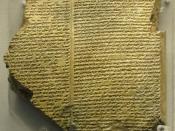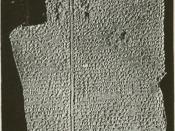Mesopotamia: Where the Glass is Half Empty As seen in neolithic history, civilization was not a way of life taken to optimistically. Civilization was the onset of sedentary behavior, not ease of living. Many ideas were new and not understood. These observations become obvious in works of literature that date back to this existence. Three works to be addressed are the Epic of Gilgamesh, the Penitential Prayer to Every God, and the Poem of the Righteous Sufferer. These writings provide a window to look into mesopotamian life and illustrate the importance of writing which was founded in neolithic times. As a result these writings distinguish the mesopotamian life as being pessimistic in mindset, fearful toward the gods, and socially binding which fuels this hopeless fear.
In Mesopotamia pessimism is seen to be an inescapable way of life. One could do what ever he could to better his condition but never see the fruit of his attempts.
Situations were what they were and could not just be changed. With this fact in place how is one expected to be optimistic? As seen in the Poem of the Righteous Sufferer after a man'smany attempts to succeed, failure is all that is obtained. Another observation within the piece is how those who are apathetic toward achievement receive no obvious misfavor. On the other hand, in the parable within the Epic of Gilgamesh one man is simply chosen to be spared from flood not necessarily for anything he had done, but just because it was so. This supports an idea of luck based success. This instance also shows how one doesn't even have much power over there own life or death. In the third work, Penitential Prayer to Every God, a desperate tone of paralyzation is noted. Not paralyzation of the body,


